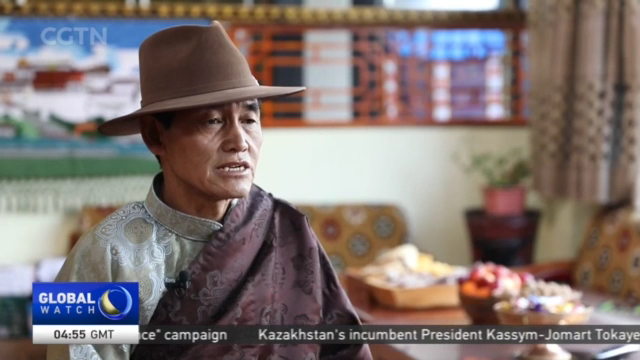
13:27, 10-Jun-2019
Tibet: A Journey Through Time: Radical changes 60 years since democratic reform
Updated
18:20, 11-Jun-2019
03:12

CGTN reporter Yang Jinghao traveled to different areas of Tibet, to find out about the changes it has undergone over the past six decades in terms of people's livelihoods, the ecological environment and traditional cultures. Starting today, we'll have five stories to showcase the plateau region's development. The first episode will give us a glimpse of local people's lives before and after the democratic reform.
Endless work and frequent torture, even persecution. This is how most Tibetans lived under feudal serfdom without any freedom or property. Written and performed by local Tibetans, this play recreates the dark days before democratic reform started in Tibet in 1959. Even today, the bitterness is still etched in the minds of many elderly people. 68-year-old Lhakpa Phuntsok often recalls his childhood life spent mostly in a cramped shabby house when his parents worked as serfs for a noble family.
LHAKPA PHUNTSOK TIBETAN RESIDENT "At that time, my parents started work before dawn every day in the manor, and I was locked alone in this room. Often feeling frightened and hungry, I always tried to sneak out from the window."
would be shocked with a glance at the manor where his parents were forced to laboriously work.
YANG JINGHAO XIGAZE, TIBET "From the beautiful decorations and luxurious living supplies, it's easy to see how extravagant the lives of the aristocrats were."
Phuntsok's mother died of pneumonia at a young age. Like all other serfs, she had never seen a doctor in her life. The heavy shackles were not smashed until March of 1959 when the Chinese Central Government dissolved the aristocratic local government of Tibet and freed more than 1 million serfs. Phuntsok says his life has undergone significant changes since liberation.
LHAKPA PHUNTSOK TIBETAN RESIDENT "We got cattle and farmlands. Now we live in a big house, and many families even have cars. It's also very convenient to see a doctor when we are sick."
Some 300 kilometers from Phuntsok's home, the Kesong Community in Shannan city was the first part of Tibet that carried out democratic reform. Its progress has well reflected Tibet's development along the way. Regarded as a model, the Penpa family here has developed various businesses over the years. Their annual income exceeds 1 million yuan, about 150 thousand US dollars.
PENPA TIBETAN RESIDENT "We enjoy many preferential policies today, such as bank loans. As long as we work hard, we can achieve a lot that we could not have dreamed of before, and I feel our lives will only get better."
Many Tibetans say it's the best time of their lives. For younger generations, the cruel oppression their ancestors suffered is a history they feel should be learned and forever remembered. YJH, CGTN, Tibet Autonomous Region.

SITEMAP
Copyright © 2018 CGTN. Beijing ICP prepared NO.16065310-3
Copyright © 2018 CGTN. Beijing ICP prepared NO.16065310-3